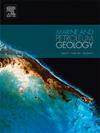Disentangling and interpreting nonlinear molecular and isotopic variations in petroleum using machine learning
IF 3.7
2区 地球科学
Q1 GEOSCIENCES, MULTIDISCIPLINARY
引用次数: 0
Abstract
Nonlinear variations in the molecular and isotopic compositions of phases in complex geosystems greatly hinder the application of geochemical proxies. This study aims to disentangle the implicit nonlinear mathematical structures embedded in geochemical datasets, effectively disaggregating overlapping geological influences that drive the intricate variations in the geochemical signatures of phases. Employing a typical hybrid petroleum system as a case study, we utilize an unsupervised machine learning algorithm to visualize the effects of source disparities and distinct evolutionary processes, such as mixing, thermal maturation, biodegradation, and evaporative fractionation, on the molecular compositions among crude oils. We further investigate the regression relationship between molecular composition and bulk δ13C signal in petroleum. Our findings reveal that by decomposing the regression model to solely reflect a specific dominant influence, the model could provide a precise geological interpretation. Accordingly, we unravel the subtle variations and underlying mechanisms of carbon isotopic fractionation in petroleum substances from different origins under the impact of maturation. Our results underscore the substantial potential of strategically applied machine learning techniques in reconstructing the geochemical evolution of complex geosystems, advocating for their broader application.
利用机器学习分解和解释石油中的非线性分子和同位素变化
复杂地质系统中各相分子和同位素组成的非线性变化极大地阻碍了地球化学代用指标的应用。本研究旨在揭示蕴藏在地球化学数据集中的隐含非线性数学结构,有效分解驱动各相地球化学特征复杂变化的重叠地质影响因素。以一个典型的混合石油系统为例,我们利用一种无监督机器学习算法,直观地显示了来源差异和不同演化过程(如混合、热成熟、生物降解和蒸发分馏)对原油分子组成的影响。我们进一步研究了石油中分子组成与体积δ13C 信号之间的回归关系。我们的研究结果表明,将回归模型分解为仅反映特定主导影响的模型,可以提供精确的地质解释。因此,我们揭示了不同来源的石油物质在成熟影响下碳同位素分馏的微妙变化和内在机制。我们的研究结果凸显了战略性应用机器学习技术重建复杂地球生态系统地球化学演化的巨大潜力,从而推动了机器学习技术的广泛应用。
本文章由计算机程序翻译,如有差异,请以英文原文为准。
求助全文
约1分钟内获得全文
求助全文
来源期刊

Marine and Petroleum Geology
地学-地球科学综合
CiteScore
8.80
自引率
14.30%
发文量
475
审稿时长
63 days
期刊介绍:
Marine and Petroleum Geology is the pre-eminent international forum for the exchange of multidisciplinary concepts, interpretations and techniques for all concerned with marine and petroleum geology in industry, government and academia. Rapid bimonthly publication allows early communications of papers or short communications to the geoscience community.
Marine and Petroleum Geology is essential reading for geologists, geophysicists and explorationists in industry, government and academia working in the following areas: marine geology; basin analysis and evaluation; organic geochemistry; reserve/resource estimation; seismic stratigraphy; thermal models of basic evolution; sedimentary geology; continental margins; geophysical interpretation; structural geology/tectonics; formation evaluation techniques; well logging.
 求助内容:
求助内容: 应助结果提醒方式:
应助结果提醒方式:


